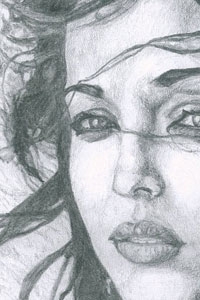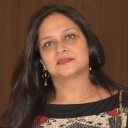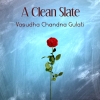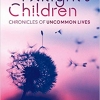
Unfound, Searching for Home
‘Adopted’. I was five when I first heard the word. It didn’t hold any significance for me … but … the way it was said … in a hushed whisper, with the speaker’s eyes on me … I felt it somehow belonged to me. I asked my mother what it meant when she gave me a bath that night, the blood-drained look on her face belied the casual tone in which she said it’s just a word, don’t bother about it. She then started asking me about my day at school as she scrubbed my back harshly, I knew better than to ask another question after that. You see, Mum could be quite grim when she was angry, oh she never hit me or anything; she had her own ways to show her displeasure. She just held my arm tighter than was comfortable while crossing the road or pinched my thigh while she helped me wear my pajamas or pulled harder when she combed my hair or stretched my plaits tighter than usual.
I was an only child. My parents were much older than the parents of my other friends. It didn’t bother me much when I was young. Mum was kind of alright most of the times, mostly she was just strict and not very affectionate; hugs and kisses were not passed around freely in our household. Dad was mild-mannered with a twinkle in his eye. I liked the way he would ruffle my hair as he left for work in the morning and again when he returned in the evenings from office. He wasn’t much of a talker, locking himself in his study with his collection of ancient manuscripts and rare books any spare time that he had, which was most of the times he was home.
Mum was the boss, I realised this very young. There was not much fun allowed in our home. I learnt early to keep out of Mum’s way when she was in her moods, which were most days. I wasn’t permitted to bring other children over to my house. All the noise and mirth gave her a headache. Dad’s job in the Railways had us posted in small towns around the country. Luckily, one of the perks of working with the Railway’s meant that we always lived in sprawling bungalows with large backyards and gardens. There were lots of places to explore for a kid with imagination and I had oodles of that.
The highlight of my year would be the end of summer when Dad’s younger brother, Vijay Chacha, his wife, Vineeta Chachi, and their three kids, Varun, Vikram and Varnika, would come to spend two weeks with us. Mum called them the ‘V’ lot in a deriding tone when they were not around. They came from Delhi, where Vijay Chacha had a successful garment export business. They were a happy bunch, always smiling, constantly hugging and laughing with their kids. Vineeta Chachi was full of life, chattering nineteen to the dozen with everyone. I liked Mum in those days. She was a different person when they came. Normally stiff with the neighbours, she would smile and listen indulgently while Chachi followed her around bringing her up to date with the happenings in Delhi and with all their relatives. We never travelled to meet the relatives in Delhi or anywhere, Mum and Dad were estranged from everyone. Mum didn’t like any of Dad’s family and her own was all gone.
Those summer days were the happiest of my year. I basked in the love that my uncle and aunt showered on me. Vijay Chacha would swing me up in the air and even though my breath caught in my throat, I loved it. I knew, as a child can only know, that he would never let me fall. He would give me the tightest of hugs and want to know all the tiny details of the past year and how it had fared for me. Vineeta Chachi everything that Mum was not; hugs and kisses flowed out of her as if compensating for their absence for the rest of the year.
In my childish excitement, I never noticed the faraway look of pain that lurked in Chacha’s or Chachi’s eyes misting over with every hug that I got.
They got me wonderful gifts too. Dresses, toys, stationary, yummy candies, cakes and cookies all from Italy or Spain or Australia, or wherever they had just returned from holidaying! I opened all the gifts and wore all the dresses as soon as possible, gobbling the goodies too, as I knew Mum would be her dour self as soon as they left, dropping hints of how frivolous ‘these things’ were, and I would slowly hand them over to placate her and never see them again.
The cousins were all older than me. Varun, the eldest, by eight years, then came Vikram by six years and Varnika by four years. They were so different from me – always laughing, teasing each other, fighting and then making up. They constantly found new ways to have fun, we would play tag, cricket, hide and seek and lots of board games that they carried when they visited. They let me be a part in their games and I always fooled myself into believing that I were their sibling too and not just the cousin they visited every year. Their life at home was also so different from mine with friends who came over for play dates and birthday parties and gifts. Birthday parties seemed like a strange idea to me. On my birthday, Dad, on his way back from office, would bring a small cake – how much can three people eat he would joke. Mum would have the cook make some samosas, which were my favourite and I would wear a new dress and open my present, which would always be a book, from Dad.
“She looks just like her real father, the same eyes, vivid green and the same complexion, fair, not at all like Memsahib, who’s dusky and has brown eyes,” I overheard the maid gossiping with the gardener.
“But Sahib also has vivid green eyes and is fair, she looks like him,” reasoned the gardener.
“Yes, she does, but haven’t you noticed she also has thick and straight hair like her real mother, both Sahib’s and Memsahib’s hair is curly,” she countered. “I heard that they adopted her.”
Adopted.
There it was again, that word, this time I was ten years old and had looked up the meaning, so I didn’t have to ask Mum.
I felt a storm build up inside me; an intense sensation of dread seemed to rise from the pit of my stomach like a wave that ended in a roar as it rushed out through my ears. I ran from the kitchen garden through the large veranda and up the flight of stairs searching for Mum from room to room till I found her putting away the linen in the store cupboard as Chachi stood beside her.
“Am I adopted?” I shouted as I barged into the room.
Mum dropped the bundle of towels that she held in her hands going pale and deathly still, while Chachi’s hand came up to her mouth as she stifled a moan. The silence was deafening. My chest heaved from exertion as well as suppressed emotion that threatened to spill over as both women stared at me, one’s eyes slowly narrowing in anger and the other’s with grief.
“What kind of behaviour is this, Riddhii?” demanded Mum, “Where are your manners?”
“Answer me, Mum,” I shouted back, for once not afraid of riling her.
“Who’s filling your head with this drivel?” raged Mum. My eyes searching for the truth swivelled from one to the other, Mum stiff in her indignant rage glaring at me and Chachi slumped down on the wooden floor, eyes closed with a look of pain, as if someone had punched her in the gut,
“Go to your room immediately, and don’t come out unless I call you,” I heard Mum’s voice coming from far away. Her tone brooking no argument, finally getting through to me.
I turned and went into my room. I waited for someone to come to me. Anyone. But, no one did that night. I heard some faraway sounds of adults arguing and someone weeping, and then that too died away. I don’t remember when I fell asleep, and awoke close to dawn to the sounds of car doors slamming. I ran down from my room to the portico, just in time to see the tail end of Vijay Chacha’s car as it pulled out of the bungalow’s gates.
That was the last time they came to visit.
Life returned to the same around the house. I didn’t ask about my being adopted ever again. The years passed as I tried to be as invisible as I could; lost in my own fantasy world where no one and nothing could make me feel.
Dad retired when I was eighteen and we moved to a small flat in Delhi. I had always done well in school and had the grades to get into the graduate English course at Lady Shri Ram College. I had thought of applying for Journalism, however, Mum did not think it was suitable. School had always been an escape from the oppressive atmosphere at home, and now college took its place.
Life would have continued in the same manner had it not been for the first friend I ever made.
Shweta and I were as different as two people can be. She was boisterous, confident, a rebel without a cause as she liked to describe herself. With one look at me she had decided I needed saving, was how she would later tell people why she befriended me. I like every other choice that I had ever made in life, went along with the force of nature that pulled us two together. And just like that again there was something to look forward to.
I never spoke to Shweta about home and she never asked me any questions either. From drama to music, environment causes to saving animals, I followed her into every rally or demonstration that happened to catch her fancy. A feminist to the core she taught me what it was to stand up for what I believed in. I laughed with her like I had never laughed before and three years passed rather quickly. I had now a new-found confidence and decided to confront Mum into letting me pursue Journalism like I wanted to. How was I to know that fate had other plans?
One day I returned home to find Vijay Chacha and Vineeta Chachi in our living room with Mum and Dad. All the adults looked tense, the air seemed heavy like it does just before a storm is about to break. I wasn’t sure what was expected off me so I wished them quietly and made my way to my room. For a while there was a deafening silence in the house and then Mum came to me.
“We’ve arranged a match for you, Riddhii,” she informed me.
“What are they doing here?” I asked in a dead wooden voice.
“The boy’s family will be coming tomorrow for the engagement ceremony. They are known to your Chacha and Chachi,” replied Mum.
“Just like that, Mum? Don’t I get a choice in the matter?” I asked quietly.
“What do you mean by choice, young lady?” bristled Mum.
“What if I want to study further? What if I don’t want to be married?” I shouted.
Hearing the loud voices the other adults too walked into my tiny room.
“We’ve found a wonderful boy for you, Riddhii,” said Chachi, “He’s well educated, handsome and you are sure to like him.”
“So it’s decided then?” I asked, “I don’t have any choice, just like I never had when I was born and you gave me away?”
Chachi visibly flinched to this.
“I…I…,” she started.
“Am I never to be allowed to make any decisions about my life?”
“Yes, we adopted you!” shouted Mum, “Is that what you’ve wanted to know all these years?”
“I’ve known since I was ten, Mum,” I smiled ruefully.
“Have you lacked anything in life?” she demanded, “We’ve given you a safe home, clothes, an education, everything that a child needs!”
“Everything, Mum, but love, warmth, laughter, self-worth!” I shouted back beyond caring. “You stole my childhood.”
“But … but,” spluttered Mum, “I did my best, even when I didn’t want you. Your Dad was the one who took in his brother’s child.”
That should have hurt more, but, strangely it didn’t, I probably knew all along.
“And you, my birth parents, you waltz in here today, deciding my fate again, not bothering to think if that’s what I would want!”
“I didn’t want to, Ridhii,” pleaded a crying Chachi. “They all made me.”
“We didn’t think you would be unhappy,” began Chacha, “We loved you from the moment you were born and had full faith in Bhaisaheb and Bhabhiji.”
“Did you never notice the difference when you visited, between your well-loved children and well-looked after me?”
“We did,” he pleaded, “But, we didn’t think it was so bad for you!”
“Didn’t think or turned a blind eye? At least be honest with me now.”
The years of hurt spilled out of me in torrents that I could no longer control.
“Do you know how many times I wished that you would come for me, and take me into the fold of the happy home that you had for your other kids? You didn’t even bother to visit in the last ten years.”
“We all thought it were the best for you,” said Dad as he broke his silence.
Life was ironic, here I had two sets of parents and I felt unloved by both.
“You all decided my childhood before I was born. I couldn’t do anything about that. But, now I’m grown up and I choose to take charge of my life from here on.”
I left home that evening. Shweta met me at the Metro station near her home and her parents took me in. Her home had a culture of freedom, of new age parenting. Where discussion and independence was encouraged, a home where life together was celebrated. Here I found the anchorage I so desperately craved.
They all encouraged me to continue my studies, promising to support me through it. However, I decided it was time to make my own way in life. It took me a few days to find a job, as a junior copy editor in a leading daily. There were difficult days and many more storms to weather, which I did, winning some and losing others.
Today, Shweta and I both share a flat together in Delhi. She runs an NGO for battered women and I’ve just been promoted as Chief Editor. I have adopted two girls and a boy; they were orphaned in the 2013 Uttarakhand floods. They are beginning to feel more secure and call me Mama now. I cry with them when they miss their birth parents, I laugh with them over jokes. I fuss over them and make them eat all their veggies, I scold them when they do something that can be harmful. I wonder with them as we unravel the mysteries of science or our planet. I read with them at night warm stories of happy animals or children. I constantly hug them and kiss them as we together dream, of a future full of promise. I’m home now.
About the Author







Comments